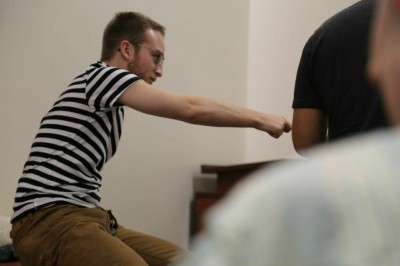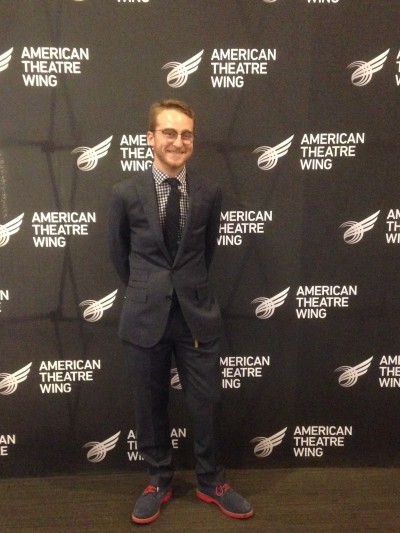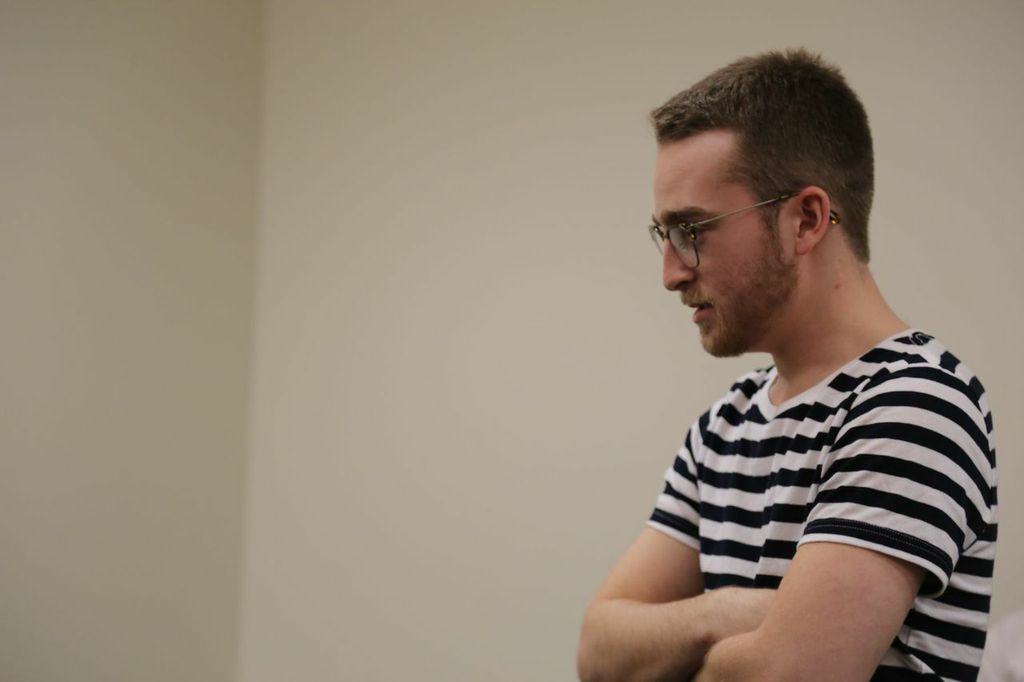
At 19, NYU freshman Jake Rosenberg is already one of the most accomplished young playwrights in the country, getting his plays put on around the country and winning multiple awards. After seeing his latest play, Muse of Fire, a comedy about Auschwitz inmates putting on a farce about the Dreyfus affair, New Voices editor Derek Kwait caught up with Jake to learn his advice for success and find out more about his relationship to Jewish identity and the Holocaust, and how they shaped his controversial play.
Talk about the growth of the Muse of Fire from its birth as a senior project to its life today as a stage production.
This play began as a project for the Jewish Community High School of the Bay. While the project didn’t require that I actually teach anyone anything with the play, I felt like I had a duty to accurately portray the facts of this story to the most plausible degree, even though ultimately, it’s fictional. I was also acutely aware that I was (and still am) taking a controversial stance towards observing the memory of the Holocaust, so I made it my primary goal in initial drafts to teach the history of the Dreyfus affair, the story of the men in these camps, and my own personal point of view regarding the Holocaust in culture. I did this to present a logical argument for my opinions, but I realized during the first staged reading that while teaching is a noble aspiration, it’s not a great reason to write a play. In subsequent versions, and especially the current version, the goal is no longer to teach, but to entertain. I feel like, as I grow more confident in my own abilities, my writing is taking less of a didactic tone, and the work and ideas are beginning to speak for themselves.
How did you start as a playwright and how have you grown since then?
I began to write plays my sophomore year of high school, at the age of 16. There was a class offered at my school, and I took it on a whim, and discovered in myself a tremendous interest in dramatic writing. It came very naturally to me very quickly. At one point, my teacher encouraged me to submit a short comedy play I had written called The Scotland Company to an open call by The Thunderbird Theater Company of San Francisco, and they liked it! It was accepted and produced for a full run! And the Thunderbird’s were the best first company I could possibly work with, because they knew I was starting out, so they gave me real instruction, and showed me the ropes. It was an incredible learning experience. Really, from that moment I’ve never thought about being anything else.
What advice do you have for other young playwrights?
Read plays. Read read read read read. I have a big list my high school drama teacher gave me called “The 200 Plays Every Theater Major Should Read.” I’ve been working through that list ever since I’ve gotten it. I know for a fact my playwriting knowledge would be woefully incomplete if I hadn’t been prepared to go to the library and sit down with a stack of classics and just devote all my free time to monastic study. Young playwrights are just that: young. So I have no problems with the kind of content that is prevalent among most young playwrights, because they’re taking time to experiment and find their voice. I think it’s just important to understand exactly what tradition you’re either furthering or abolishing.
How you make play productions happen?
First and foremost, you act friendly to people. You want to be someone people want to work with. After that, the options are infinite. My strategy has always been to submit any play I have to any company, contest or opportunity I come across. 99 times out of 100, you won’t get anything, but that means there’s always that one chance. Let’s say you dedicate yourself to making 500 submissions a month. Well, if you can find all of those, by the end of the month you’re going to have five acceptances! After a while, they start to build up. And if no one is accepting your work, be prepared to roll up your sleeves and self-produce! Muse of Fire is the third production I’ve had the privilege to self-produce and I’ve learned more about writing, directing and producing from it than I ever could have in a classroom. It’s hard work, but if you sit on your butt waiting for people to notice you, it might not ever happen. I recommend every young playwright tries it at least once!
What are your favorite plays, playwrights, and authors?
Where to begin. Jez Butterworth’s Jerusalem, Anne Washburn’s Mr. Burns. Anything by Michael Frayn or Sophocles. John Barton’s Tantalus Cycle, Tom Stoppard’s Arcadia and Coast of Utopia Trilogy, Alan Moore’s Lost Girls. Tarantino’s Inglourious Basterds screenplay has a permanent place by my bedside, and I saw a production of Tony Kushner’s The Intelligent Homosexual’s Guide to Socialism and Capitalism with a Key To the Scriptures this year that has literally changed my life and entire personal political constitution.
How does Jewishness/your Jewish identity factor into the rest of your work, if at all?
I am not religious by any stretch of the imagination, but I’ve always been a part of the Jewish Community in some way or another. I went to Sunday school and summer camp and ultimately a Jewish high school. What I like about Judaism is the tight personal community, but as I’ve grown older and seen more of the world, I’ve seen that community come under attack by people who’d like to impose their dogma on it. Maybe it was because as a high schooler I just had problems with authority, but I noticed all kinds of dogmatic principles being repeated again and again, about the religious components of Judaism, the philosophical components of Judaism, and most importantly to me, the use of humor in every day life. Muse of Fire came about as a reaction to that, as a way of saying “I refuse to let this community be stagnated by forcing this kind of belief or that kind of observance.” It was my attempt at rocking the boat and getting people talking. If I have one hope for Muse of Fire, it’s that it might enlighten people to the possibility of discourse and invention in the Jewish Community, as opposed to saying that we have to compromise to make everyone feel happy by only observing things one way.
Related to the themes of Muse of Fire, what role has anti-Semitism had in shaping your Jewish identity?
I’ve never once in my life experienced direct anti-Semitism, however, growing up Jewish it can’t be escaped. As horrible as it sounds, it’s actually a major part of the culture, and is, in my opinion, directly responsible for the great Jewish affinity for comedy. In order to survive, we have to first cope with centuries of trauma behind us, and the best way to cope with any trauma is with laughter. Or food.
Do you have a personal connection to the Holocaust?
Like most Jews in this country, a significant portion of my family died in the Holocaust, but they are far removed, belonging to a totally different country and generation. I think my most personal connection the Holocaust isn’t through my family history, but this play. I think I created it partially as an attempt to forge that connection through creating something personal. That’s what’s always most effective for me…stories! When people can find a human element in a complicated idea, it’s that much easier for them to feel connected.
Talk a little about your use of the Holocuast in the play and how you feel art can and should relate to it.
Talking about the Holocaust in ways that are not “pre-approved” is frowned upon in the Jewish community where I’m from. It just is, plain and simple. I had always wanted to write a comedy about the Holocaust in order to break that “ultimate taboo”, but I had never figured out a way to do it sensitively or to make a point. When I discovered the story of Jews who had performed subversive comedy shtick in the actual Holocaust, I knew I had an incredibly compelling story for this play, because here was true historical evidence that my beliefs had merit! The facts supported my belief that comedy is necessary to survival! A lot of the Holocaust narratives we see in our culture are strikingly similar. They portray Jews as victims or lucky survivors, but they’re almost always based on true stories. The purpose for these narratives is remembrance. The same stories are effectively trumped out again and again so as to make sure people “Never Forget.” But these movies and books focus so much on observance and consecration of the facts that they sacrifice creating a personal connection or saying something new. I think narrative art about the Holocaust should strive to do what all other narrative art about any subject does, which is to get people to think about its subject matter in new ways. I don’t think the Holocaust should be branded as a special subject and placed in a special category and be forced to lag behind every other subject in theater and film, because then it will get stale. We’ve got to keep inventing.
Do you feel the need to tread a certain way around the Holocaust because of how irresponsibly others are using it?
I don’t think irresponsibly is the right word, though I can see how some people might interpret my views as a little harsh. The act of observance of the facts is incredibly important, and if someone wants to write a play merely to memorialize the Holocaust, I say go for it. There really isn’t anything wrong with that! I just don’t think it should be the only way it’s discussed. The need for multiplicity of opinion towards observing the past in the Jewish Community has never been stronger, and I fully support any way anyone wants to do that. I’m not calling for the abolition of a certain kind of Holocaust art. I just don’t want anyone to censor any kind of new stories. There’s a quote I hang on my wall by Thomas Babington Macaulay and look at whenever I can. “Men are never so likely to settle a question rightly as when they discuss it freely.”


